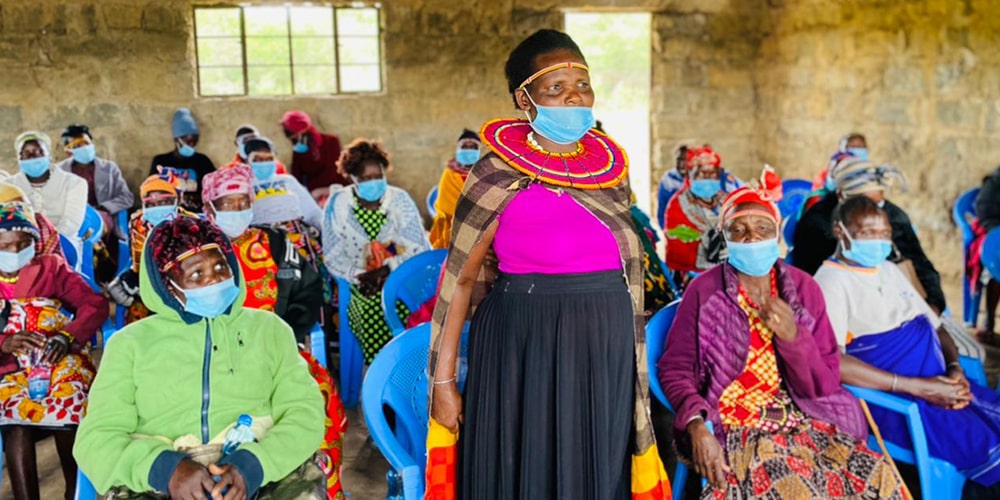by Edwin Bett
In today’s rapidly evolving digital world, the integration of technology into public services is fundamentally changing the way we approach workers’ rights. The digitalization of social protection systems is reshaping how workers, particularly those in the informal economy, access their entitlements. In this context, African home-based workers face a unique set of challenges related to digital exclusion, privacy, and the accountability of private sector companies handling their data. For example, home-based workers often lack access to the technology and infrastructure needed to benefit from digitalized services. At the same time, the transition to digital systems can expose them to risks such as data breaches or surveillance.
Understanding these challenges formed the basis for HomeNet Africa’s participation in the Digital Rights and Inclusion Forum (DRIF) 2024, a leading forum for digital rights in Africa. The forum’s theme, “Fostering Rights and Inclusion in the Digital Age,” resonated deeply with HomeNet Africa’s mission to advocate for marginalized workers across the continent.
The Importance of DRIF 2024
DRIF is one of the most significant annual events on the African continent for discussing digital rights and inclusion. The 2024 conference, held in Accra, Ghana, brought together over 300 delegates and featured more than 80 sessions covering topics such as digital security, data protection, and the inclusion of vulnerable populations in the digital economy.
For HomeNet Africa, DRIF was an essential platform to voice the challenges that marginalized workers face in the digital age. The organization used the event to share insights and research findings from their ongoing projects, particularly the “Digital Social Protection in Africa” project. This initiative, led by the Institute of Development Studies (IDS) at the University of Sussex, aims to bridge the gap between workers’ rights organizations and digital rights organizations across Africa. The project’s goal is to increase the influence of marginalized workers’ voices in digital policy discussions. With the rapid digitalization of social protection systems across Africa, this work is vital to ensuring that workers, especially those who are marginalized or excluded, benefit from the transition to digital systems.
Key Takeaways and Insights
During DRIF 2024, HomeNet Africa engaged in a range of discussions and activities aimed at highlighting the intersection between workers’ rights and digital rights. One of the most significant takeaways from the forum was the realization that these two areas are not separate but deeply interconnected: workers’ rights are digital rights, and digital rights are workers’ rights.
For instance, access to affordable data and digital infrastructure is essential for workers to engage with digitalized social protection systems. Without these basic rights, workers are excluded from accessing critical resources. Privacy and data protection are also central concerns. Home-based workers often have little choice but to share personal information with digital platforms, and ensuring that this data is handled securely and transparently is a major challenge.
HomeNet Africa shared several key findings from their research at the forum. They pointed out that home-based workers are often excluded from national social protection policies and insurance schemes due to their informal employment status. The organization advocated for more inclusive digital infrastructure and called for policies that ensure the protection of workers’ digital and personal rights. They also highlighted the need for more education and awareness around digital tools, empowering workers to take advantage of the opportunities offered by digitalization while mitigating its risks.
Building Partnerships and Looking Forward
DRIF 2024 also provided an excellent opportunity for HomeNet Africa to build and strengthen partnerships with other organizations working on digital and workers’ rights. Through collaboration with partners like Paradigm Initiative, African Platform for Social Protection (APSP), International Trade Union Confederation (ITUC), International Domestic Workers Federation (IDWF), and StreetNet International, we are working towards a coalition to ensure the protection of marginalized workers’ rights in the digital sphere. The discussions at DRIF emphasized the need for solidarity across sectors.
The Path Ahead
So, what do we think needs to happen next? First, governments and policymakers must recognize the critical role that digital rights play in ensuring that all workers can fully enjoy their rights. Investment in digital infrastructure is crucial, particularly in regions where access to technology is limited. Affordable data, secure digital platforms, and transparent data policies are all necessary to protect the rights of workers in the digital age.
Second, there needs to be a concerted effort to educate and empower workers, particularly those in the informal economy, about digital tools. By providing training on digital platforms, devices, and data, workers can be better equipped to navigate the digital world and advocate for their rights.
Finally, organizations like HomeNet Africa must continue to work collaboratively with partners across sectors to push for policies that ensure a just transition to digital social protection systems. These systems must benefit all workers, especially those who are most marginalized.
The future of work is digital, and HomeNet Africa is committed to ensuring that this future is inclusive and just for all workers, especially the most vulnerable. In the end, ensuring that workers’ rights and digital rights are seen as interconnected is not just about adapting to technological changes—it’s about ensuring that no one is left behind as the world of work evolves.



